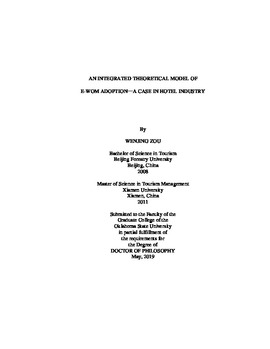| dc.contributor.advisor | Qu, Hailin | |
| dc.contributor.author | Zou, Wenjing | |
| dc.date.accessioned | 2019-10-25T19:51:50Z | |
| dc.date.available | 2019-10-25T19:51:50Z | |
| dc.date.issued | 2019-05-01 | |
| dc.identifier.uri | https://hdl.handle.net/11244/321591 | |
| dc.description.abstract | The purposes of this study were (a) to establish and empirically test an integrated theoretical model of e-WOM adoption based on technology acceptance model and elaboration likelihood model; and, (b) to provide implications and suggestions for marketing practitioners in the hotel industry. The significances of the study were investigating the combined effect of perceived usefulness and perceived credibility on e-WOM adoption, examining the antecedent factors of perceived usefulness and perceived credibility in hotel context, and testing the moderating effects of expertise and involvement. Descriptive and causal research design was employed to test the proposed research model. By using convenience sampling, a self-administered questionnaire was distributed through Amazon Mechanical Turk. A total of 531 responses were analyzed. Multiple statistical methods, including descriptive statistics, a Harman's single-factor test, confirmatory factor analysis and structural equation modeling were used for data analysis. | |
| dc.description.abstract | The results of structural equation modeling (SEM) for the proposed e-WOM adoption model supported all path relations among constructs that were hypothesized, except for the relationship between information timeliness and perceived usefulness. Furthermore, a series of multi-group SEM results revealed that there were moderating effects of (a) receiver expertise between attitude toward e-WOM and e-WOM adoption; (b) involvement between information relevance and perceived usefulness; (c) involvement between information sidedness, review consistency and perceived credibility. However, there were no statistically significant moderating effects of involvement between (a) information timeliness, information completeness and perceived usefulness, and between (b) review rating, product rating and perceived credibility. The findings suggested that perceived credibility play a vital role in e-WOM adoption; information timeliness was not found to be an important indicator for perceived usefulness. Furthermore, the higher degree of expertise on hotels a traveler obtains, the less likely that attitude significantly influences his or her adoption of e-WOM. The results suggested practitioners pay more attention to the design of the e-WOM exhibition system, and more peripheral cues should be provided by the administrators of the review forums. | |
| dc.format | application/pdf | |
| dc.language | en_US | |
| dc.rights | Copyright is held by the author who has granted the Oklahoma State University Library the non-exclusive right to share this material in its institutional repository. Contact Digital Library Services at lib-dls@okstate.edu or 405-744-9161 for the permission policy on the use, reproduction or distribution of this material. | |
| dc.title | Integrated Theoretical Model of e-WOM Adoption - A Case in Hotel Industry | |
| dc.contributor.committeeMember | Hancer, Murat | |
| dc.contributor.committeeMember | Leong, Jerrold | |
| dc.contributor.committeeMember | Brown, Tom J. | |
| osu.filename | Zou_okstate_0664D_16229.pdf | |
| osu.accesstype | Open Access | |
| dc.type.genre | Dissertation | |
| dc.type.material | Text | |
| dc.subject.keywords | elm | |
| dc.subject.keywords | e-wom adoption | |
| dc.subject.keywords | hospitality | |
| dc.subject.keywords | online review | |
| dc.subject.keywords | tam | |
| thesis.degree.discipline | Human Sciences | |
| thesis.degree.grantor | Oklahoma State University | |
